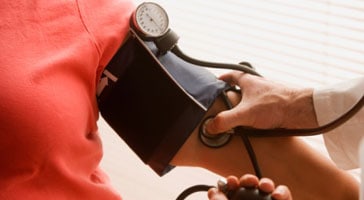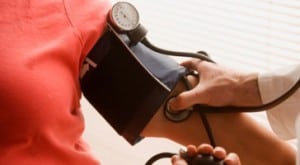Natural Remedies for High Blood Pressure
What Is High Blood Pressure?
High blood pressure is a moderately common health condition that happens when the force of your blood pushing against your arteries is high enough that it eventually causes heart problems and disease. Blood pressure is determined by the amount of blood that your heart is pumping compared to the resistance to blood flow in your arteries.
Treating High Blood Pressure Holistically
One of the simplest and most effective ways to lower blood pressure is to improve your diet. Improving your diet and increasing your daily exercise can help naturally and safely reduce blood pressure. You can also try combining that approach with taking a few herbal and nutritional supplements that can help treat high blood pressure. We’ve included 12 natural ways to help lower blood pressure without having to resort to prescription medications.
1. Reduce Stress
The American Heart Association (AHA) reports that although stress isn’t a direct cause of heart disease, it’s a major contributing factor to higher blood pressure and reduced overall wellness. Check out our article here on reducing anxiety to get some easy natural ways you can help lower your blood pressure. Try to evaluate your priorities and cut out some of your excess activities. Also you can try deep breathing exercises, meditating, and yoga to help keep your life stress-free.
2. Eat Healthy
Eating healthy is important to reducing high blood pressure and preventing hypertension. The National Heart, Lung, and Blood Institute recommends a diet with plenty of fresh vegetables, fruits, fat-free and low-fat dairy, whole grains, fish, poultry, and beans. They also recommended to limit sodium, sweets, sugary beverages and red meat.
3. Exercise Regularly
Keeping to a regiment of daily physical activity, classified as at least 30-60 minutes of activity for most days of the week, can lower your blood pressure by anywhere between 4-9 millimeters according to the Mayo Clinic. Even walking and light strength training can help reduce high blood pressure.
4. Maintain a Healthy Weight
The Mayo Clinic also recommends that your waistline plays a large role in cardiovascular health. Losing as few as 10 pounds can help reduce blood pressure and aid in circulation.
5. Lower Sodium Intake
The AHA reports that a key to increasing heart health and decreasing blood pressure is finding the proper balance of potassium and sodium. Generally you need less sodium and more potassium. Try to cut your consumption of sodium to less than 1,500 mg per day and incorporate more potassium-rich foods into your diet like sweet potatoes, greens, spinach, mushrooms, potatoes, grapefruits, raisins, molasses, bananas, or other high-potassium foods.
6. Red Yeast Rice
Recent research shows that red yeast rice can help lower blood pressure levels. According to a study carried out by Chinese medical researchers in 2003, red yeast rice can potentially reduce your blood pressure to normal levels by consuming 600 mg 2-4 times a day.
7. Cayenne Pepper
Surprisingly, cayenne pepper contains an important compound called capsaicin which promotes healthy blood circulation to alleviate stress on your heart. Try 1 teaspoon of cayenne on your daily meal or add it to water for a hot spicy herbal tea.
8. Garlic
Studies also show that garlic can be a good remedy for alleviating high blood pressure. Take a garlic supplement or eat fresh garlic, because cooking the garlic destroys the allicin, its active compound.
9. Apple Cider Vinegar
Your body needs a balance of calcium, magnesium, and potassium to regulate blood pressure levels. Apple cider vinegar is potent with each of these compounds and can serve as an effective remedy for high blood pressure. Try drinking 2 tablespoons diluted into 8 ounces of water a day.
10. Aloe Vera
Aloe vera can help treat high blood pressure by dilating the capillaries and improving the circulation in your veins. Rich in vitamin C, aloe vera has been shown to reduce blood pressure. Try drinking 25 milliliters of pure aloe vera gel mixed with fresh vegetable or fruit juice 3 times a day.
11. Niacin
Niacin which is another name for Vitamin B3 has some remarkable health benefits. You can find it as an inexpensive supplement in most health food stores. Firstly you cannot live without this vitamin as it is essential for many cell functions. However in appropriate doses it has been shown to dramatically lower ‘bad’ cholesterol, have robust detoxification effect, reduce and prevent arthritis symptoms, relieve depression and anxiety, and also lower blood pressure. It does wonders for your circulatory system and your heart. 50 -100 mg of niacin can lead to a ‘flush’ that is a warming sensation as it makes your blood vessels dilate. This flush is actually a sign of niacin working its magic and should not be avoided. Niacinamide is often recommended as it does not produce the flush, however it does not have the same therapeutic benefits as niacin.
12. Pranayama
This is an ancient breathing technique that has a variety of uses from helping you to reduce stress, lowering blood pressure and heart rate, to even being able to control your immune system.





Do anyone still doubt natural herbs? I’ve seen the great importance of natural herbs and the wonderful work they have done in people’s lives. I wonder why people still spend their money on surgery, injections and drugs each time they are sick. Natural herbs can cure all kinds of illness including Herpes, Diabetics, Asthma, HIV, Hepatitis, etc. I’ve seen it with my own eyes. I was cured of HIV and my aunt and her husband were cured of Herpes by Dr. Iyoha who uses natural herbs to cure different kind of illness. Even Dr. Iyoha prove to the world that natural herbs can cure all illness and he cured countless people using his natural herbs. I know is hard to believe but I & my FAMILY are a living testimony. There is no harm trying herbs. He is also a spell caster, he cast spell to restore marriages back to normal, a good luck spell to prosper and excel in life. Contact Dr. Iyoha on: [email protected] or Phone number: +1 (407) 337-9869
I am high bp patient using Amfast 5 m 32 .I couldnot give up smoking. What can I do? Is it possible to stop medicine??
What’s up, yup this article is really pleasant and I have learned lot of things from it